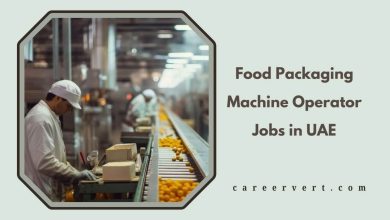Visa Sponsorship Manufacturing Worker Jobs in UK 2025

Manufacturing is a critical subsector in the United Kingdom, as it provides employment opportunities and significantly contributes to the country’s gross domestic product. There are numerous opportunities to secure employment as a manufacturing worker in the United Kingdom in 2025, with the majority of these positions providing visa sponsorship.
These encompass the qualifications for a specific position, the benefits of working in manufacturing, the duties of a manufacturing worker, the annual salary that can be anticipated, the various types of jobs that are available to a manufacturing worker, and the process that must be completed to secure a manufacturing job.
Key Points:
- Job Title: Manufacturing Worker
- Job Location: United Kingdom
- Job Type: Full-Time
- Visa Sponsorship: Available
Check Also: Visa Sponsorship Delivery Driver Jobs in UK – Apply Now
Requirements for Visa Sponsorship Manufacturing Worker Jobs in UK:
- Technical Skills: Proficiency in the operation of machinery and equipment used in the manufacturing industry. Computer-aided design (CAD) expertise is advantageous due to its potential application during the match.
- Physical Fitness: This is a long-term position that requires the ability to stand for extended periods of time, lift large objects, and perform numerous similar tasks.
- Attention to Detail: In order to guarantee the quality and safety of the final product, it is crucial to maintain accuracy during the manufacturing process.
- Problem-Solving Skills: The capacity to promptly resolve issues is essential for optimal performance.
- Communication Skills: It is essential to communicate with members of the same group and leadership.
Benefits of Visa Sponsorship Manufacturing Worker Jobs:
- Legal Work Authorisation: A sponsored visa guarantees that you are permitted to engage in legal employment within the manufacturing sector of the nation.
- High Demand for Workers: The manufacturing sector in numerous countries is experiencing a labour shortage, which has resulted in a rise in job opportunities.
- Competitive Compensation: Manufacturing positions provide consistent compensation, as well as opportunities for performance bonuses and overtime.
- Healthcare Benefits: Employers frequently offer medical insurance that covers prescriptions, hospital stays, and doctor visits.
- Pathway to Permanent Residency: Long-term residency options in countries such as the United States, Canada, and Australia may be available to individuals with work experience in manufacturing.
- Relocation Assistance: Numerous employers provide visa costs, flight expenses, and occasionally lodging support.
- Job Security and Stability: Manufacturing positions are indispensable for industries, guaranteeing consistent employment.
- Work-Life Balance: A structured work schedule is possible in numerous manufacturing positions due to the presence of fixed periods.
- On-the-job training enhances: technical abilities, thereby expanding future career prospects.
- Social Security and Pension Benefits: Financial stability is ensured after retirement through contributions to pension funds.
- Bonus Pay and Overtime: Numerous organisations provide additional compensation for productivity and overtime hours.
- Safe Work Environment: In order to safeguard employees, developed nations implement rigorous workplace safety regulations.
- Multicultural Work Environment: Collaborate with colleagues from a variety of backgrounds to increase cultural awareness.
- Family Sponsorship Opportunities: Certain visa programs permit employees to bring their spouses and children.
- Pathway to Other Industries: Opportunities in engineering, quality control, and logistics may arise as a result of manufacturing experience.
Duties for Visa Sponsorship Manufacturing Worker Jobs:
- Quality Control: Ensuring that the products are of the appropriate quality by inspecting them for any defects.
- Assembly Line Work: This frequently involves the operation of machinery or the syntactical assembly of a variety of elements or products.
- Equipment and apparatus: maintenance and cleaning.
- Inventory Management: The management of raw materials and manufactured products.
- Adhering to Safety Protocols: Ensuring that the provisions established to prevent catastrophes are adhered to.
- Issue Reporting: Informing superiors of any problems or issues that are encountered.
Salary:
The salary of manufacturing workers in the United Kingdom is contingent upon their level of experience, their place of residence, and the nature of their employment. On average,
- Experienced Employees: From £31,000 to £40,000 annually
- Candidates or experts in specific disciplines with numerous job openings may receive higher compensation.
Types of Jobs:
In the current industrial world, manufacturing businesses encompass nearly every occupation. The following are ten prevalent manufacturing worker positions that are accessible in the United Kingdom:
- Assembler: This is the specific activity of assembling elements or products that are utilised in the creation of values.
- Machinist: Executes semi-skilled operations that necessitate the use of manual tools to fabricate precise components.
- Welder: They are responsible for the operation of welding apparatus to connect metal components.
- Production Operatives: Individuals who execute the majority of the production line’s operations.
- Quality Control Inspector: Assists in verifying that the products are manufactured in accordance with the established standards.
- Maintenance Technician: And is generally responsible for the maintenance and repair of all forms of machinery.
- CNC Operator: Utilises numerical control devices to cut material.
- Fabricator: An organisation that produces steel structures or objects.
- Warehouse Operative: This position is responsible for the supervision of inventory and material within a warehouse that is currently under construction.
- Forklift Operator: Additionally, employs forklifts to transport products and supplies from one location to another.
Application Process of Manufacturing Worker Jobs in UK:
- Research: Conduct an analysis of the companies that are currently recruiting for the desired positions to determine whether they offer visa sponsorship.
- Apply Online: It is advisable to conduct a job search through recruitment agencies, employment posting websites, and the company’s website.
- Prepare for interviews: Therefore, be prepared to discuss your interest in working in the UK, your relevant skills, and your prior experience.
- Follow-Up: Subsequent to your application, it is imperative that you establish communication with the organisation to demonstrate your continued enthusiasm for the position.
- Visa Application: In the event that an individual is offered employment, they must apply for a work visa permit. The employer or superintendent of the specific personnel typically supervises this process.
Frequently Asked Questions:
-
How can I secure sponsorship for a work visa in the UK?
Initially, you must apply for jobs and inform them of your desire for visa sponsorship. Once a company agrees to hire and sponsor your visa, they apply to the UK government for a certificate of sponsorship for you. Once you have that in hand, you can apply for a skilled worker visa.
-
Why have manufacturing jobs declined in the UK?
Economic shifts, including rising labour costs and the impacts of globalisation, have compelled businesses to offshore or automate their manufacturing operations. Furthermore, technological advancements, such as automation and artificial intelligence (AI), have displaced traditional manufacturing jobs.
-
What is a manufacturing worker?
Manufacturing jobs are defined as those that create new products either directly from raw materials or components. Usually, these jobs take place in a factory, plant, or mill, but they can also occur at home, as long as they involve the creation of products, not services.



